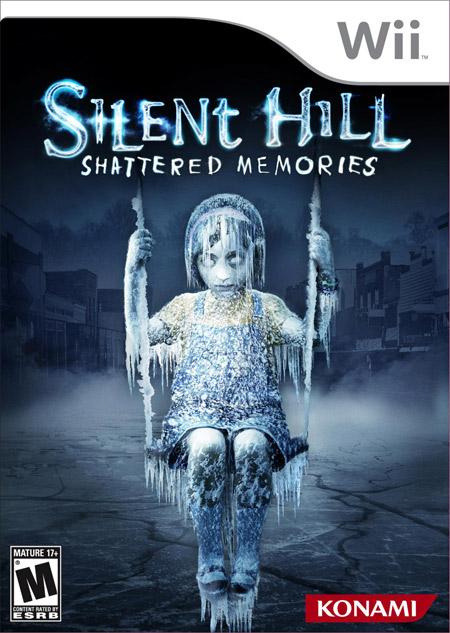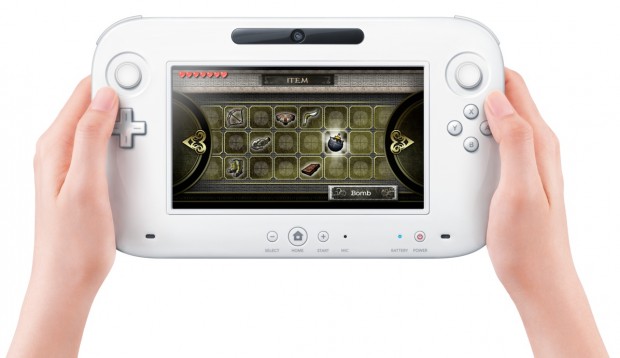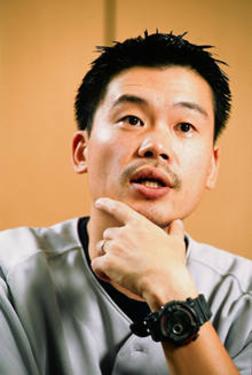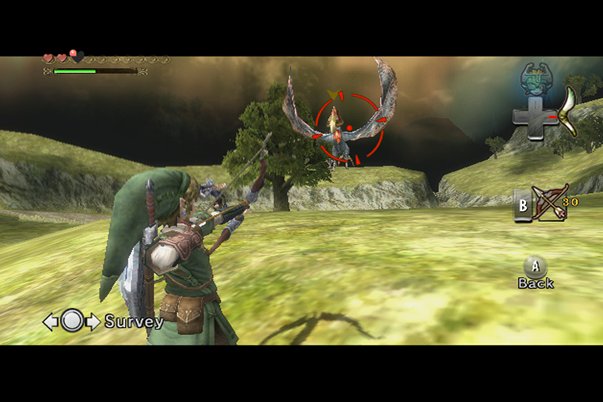 I may be a Nintendo fanboy – which my colleagues at TotalPlayStation.com were never loathe to point out during my tenure there – but I also have a heaping dose of admiration, even respect, for the other two console manufacturers (Nintendo may be my favorite company, but the Xbox has been my system of choice for two generations running now and Sony has persistently featured some of the best exclusives in the history of the medium).
I may be a Nintendo fanboy – which my colleagues at TotalPlayStation.com were never loathe to point out during my tenure there – but I also have a heaping dose of admiration, even respect, for the other two console manufacturers (Nintendo may be my favorite company, but the Xbox has been my system of choice for two generations running now and Sony has persistently featured some of the best exclusives in the history of the medium).
And despite their incessant hazing, my TPS brethren feel very much the same, from EIC Sam Bishop all the way on down – which is why discussing the particular ins and outs of both companies, their software lineups, and their very much divergent paths to the future is always an exercise in fascination and, at times, elucidation. It felt only natural, therefore, that I brought our inane drivel out to the light of day, for fanboys on both sides of the aisle to feast upon.
Now be sure to play nicely.
Coming from a Sony perspective, what’s been Nintendo’s biggest problem this past generation, and what do you think will be its most formidable one next gen?
Aram Lecis, (more) senior editor:
At the risk of sounding very obvious, I think Nintendo’s biggest problem this past generation was getting anything beyond casual and young adult games developed by outside studios. Old technology and archaic online systems were slight missteps, but I’m pretty sure you can count on one hand the number of quality “hardcore” games on the system (I’ve got… No More Heroes, Dead Space: Extraction, Silent Hill: Shattered Memories, and… not much), and that isn’t very good after four-plus years. I admire Nintendo’s ability to get so many consoles into homes, but failing to capitalize on that and capture the hearts and minds of gamers may come back to haunt them.

Climax Studios’s Silent Hill: Shattered Memories shatters the casual status quo just as much as it does our minds.
Thus, I think the most formidable problem facing the Wii U launch will be re-engaging the old gaming guard. I suspect the vast majority of the typical Wii owners aren’t going to see much reason to upgrade to a new system (because I bet the vast majority of Wii owners forgot they own one), and I worry that serious gamers are not going to be in any rush to flock back to the Nintendo fold until they see some serious software and something beyond gimmicky controllers. So far, what I have seen looks like Nintendo knows what they have to do, but gamers are a fickle bunch and dollars don’t flow as freely as they did at the start of the last generation. It might take some time to earn that respect back.
Parjanya Holtz, senior editor:
What Nintendo is doing with the Wii U, and how successful their endeavor will turn out to be this generation, is going to be some of the most interesting marketing gymnastics any company has ever had to perform in the history of modern capitalism. Unlike Sony and Microsoft’s fan base, which has mostly remained solid in Sony’s case and grew in Microsoft’s, Nintendo needs to win back those who used to loved the company but decided to go with an HD console instead, while somehow magically convincing the millions of casual Wii owners – who, like Aram said so brilliantly, probably forgot even owning a Wii – they need another overpriced digital entertainment gimmick cluttering up their living rooms.
Now, as is with many things in life, hype is most essential to the success of videogames. The Wii proved it, and the Wii U certainly has the potential to confirm the validity and success of gimmicky innovation in the industry (even the PlayStation Move sold incredibly well across the board). Consumers are obsessed with the “new” and the “exciting,” and in that regard, the Wii U absolutely delivers with its iPad-ish controllers. Nintendo’s biggest obstacle is going to be the Wii U’s price. How much is the casual market willing to dish out for a console they heard about on the seven o’clock news? And more importantly, to what degree will third-party developers and publishers be willing to support the new console with mature and unique independent properties?

The Wii U is slated to pull a Dreamcast in terms of processing power.
Let’s not kid ourselves – just like the Wii, the Wii U will most certainly be in last place when it comes to sheer processing power, as it’s safe to assume the PS4 and Xbox 720 (or whatever it’ll be called) are going to surpass the Wii U by quite a bit when they come out. The Wii U’s specs are seemingly designed to rival the PS3 and 360, not their successors.
Will I buy a Wii U? I’ve been a loyal PlayStation fan ever since falling in love with games like Tekken and Metal Gear Solid, not only because those were fantastic titles, but because the average game that made it to Sony’s console has always been a little more mature than what you would get on Nintendo’s system. However, I also own a 360 because the system has its own set of fantastic exclusives. Don’t get me wrong – I love Zelda and adore Mario, but Nintendo is missing its Gears of War, its Uncharted, its Alan Wake, its Shadow of the Colossus.
I want Nintendo to succeed not only financially, but to also be one of the companies I look forward to seeing at E3 because what they are going to show us is something new that can get me, as a gamer, excited, no matter whom I swore allegiance to. I believe competition helps the industry thrive, but Nintendo needs to get off its high horse and begin investing in exclusive properties we haven’t seen before. Give us Mario, give us Zelda, give us Smash Bros., but also be willing to give us more than that.
If that happens, and I honestly doubt it will, I’ll be the first in line to get a Wii U.
Perhaps more interestingly, what do all y’all think – from an outside, Sony POV – is the big N’s biggest strength, be it past, present, or future?
Aram Lecis, (more) senior editor:
Nintendo’s biggest strength has always been, and probably always will be, their resilience. You can make a case that their stable of popular characters is a huge asset, but I think the fact that they have continually gone against the grain of the rest of the industry and had it pay off in spades is more impressive.
Lest we forget, the NES was launched in an era where home gaming had undergone a huge crash and the general consensus was that consoles were finished. Later, when everyone was moving to the larger and cheaper CD format, Nintendo doggedly clung to the expensive cartridges they had always used and somehow we didn’t care that their games might cost 25% more and didn’t have cutting-edge full-motion video.
The pattern continued when no one could fathom what a dual screen handheld might have to offer or why we’d want one, yet suddenly everyone had to have one. I think we’d all wised up a bit by the time they announced their “revolution” of motion control, but still no one predicted the incredible runaway success the Wii was. Because of that uncanny ability to continue to press forward in the face of skepticism and to not only deliver, but exceed, expectations, I’m never willing to write off the big N, even when I don’t fully understand where the hell they are heading.
Parjanya Holtz, senior editor:
What makes Nintendo so popular and something that really is its greatest asset, I think, is its natural ability to capture and capitalize on that magical, childlike sense of awe that we’re all longing for so desperately. Nintendo never was the kind of company that would try to imitate nature, art, or films in its games, and, as a consequence, it rarely ever felt the need to follow the rest of the industry into seemingly darker and more mature-themed realms – both when it comes to its software and hardware development.
Nintendo never shied away from admitting to be a “game” company. Maybe it’s due to the traditionally-more-accepted videogame culture in Japan, but I never got the sense that there was this desperation to rival other entertainment industries like Microsoft and Sony occasionally emit. Nintendo wants to entertain, and it’s not willing forget or give up on what it was 20 years ago that made videogames great.

Pictured: Kenji Inafune, formerly of Capcom – Japan’s staunchest Japanese game industry critic.
The other thing that fascinates me about Nintendo, standing in stark contrast to especially Sony (but also Microsoft), is the company’s genuine desire to deliver quality products – even if their understanding of what that means often is a little different from ours. It’s a certain Japanese arrogance Nintendo still holds, and something Sony failed to get away with upon the PS3’s launch, that’s now almost extinct in the industry. Nintendo knows what it wants, and it pursues its goals with a persistency that’s quite frankly remarkable. No one, not even its hardcore fan base, has any influence on what the company does, an issue that occasionally leads to huge mistakes which could have easily been avoided (just give us a damn achievement system, Nintendo! Who cares if you despise it?). But it is also precisely that arrogance that gives them the creative freedoms they require to thrive in, allowing them to come up with such insanely genius and highly popular innovations like motion controls and/or dual screen handhelds.
Aram Lecis, (more) senior editor:
Hmmm… obviously, you are entitled to your opinion, since it is a subjective thing, but I feel like Nintendo lost its way a bit in that department. I’m not sure I buy into their “creative freedoms” when the vast, vast majority of Nintendo titles revolve around Mario, with most of the rest being Zelda or Metroid. I’m a little disappointed how they spent most of this generation shoehorning Mario into every conceivable situation and slapping that into a game. And the fact that perusing the Wii shelf at GameStop will reveal a huge morass of terrible shovelware that somehow got approved by Nintendo, even if they didn’t develop it, makes me think they aren’t that concerned with quality.
I also want to say that talking to independent console game devs (the real last bastion of creativity in the industry), they consistently cite Sony as far and away the most helpful and receptive company when it comes to getting your game up on PSN/XBLA/WiiWare.
I absolutely agree that Nintendo has “stayed Japanese,” but I think that isolationist attitude is starting to catch up to them a bit, and unless they step up and are more open to evolution on the software side, they run the risk of continuing to develop innovative hardware that never sees its full potential and is just a platform for new Mario and Zelda franchises.
Parjanya Holtz, senior editor:
I absolutely agree with everything you said! I think you may have misunderstood me a little in regards to what I was referring to with how it used its “creative freedom,” which I meant to aim more at its brilliant, albeit controversial, hardware development. In fact, despite some aforementioned major missteps, the Wii is a great system, that – like you’ve already pointed out – is mostly held back by Nintendo’s unwillingness to invest into software innovation and, perhaps more importantly, independent development.

It’s much maligned among many and yet still celebrated. Yep, it’s Twilight Princess, all right.
That being said, I still believe those Mario and Zelda games we are all beginning to grow tired of are some of the best titles to come out this generation. But is Nintendo’s unwillingness to compromise and invest more into software development and new independent (hardcore) IPs a form of laziness, arrogance, or ignorance? It’s probably a mixture of all three, but if it ever realizes where its weaknesses lie, and begins the process of actually working on them as Sony did so formidably over the past three or four years, then it’s difficult to tell where it could be heading. Let’s just hope that realization comes before Nintendo has entirely lost its hardcore base.
Stay tuned for part two, where the magnifying glass moves to Sony, the handheld space, and the future.
Marc N. Kleinhenz has covered gaming for a dozen publications, including Gamasutra and TotalPlayStation, where he was features editor. He also likes mittens.




 ShareThis
ShareThis






